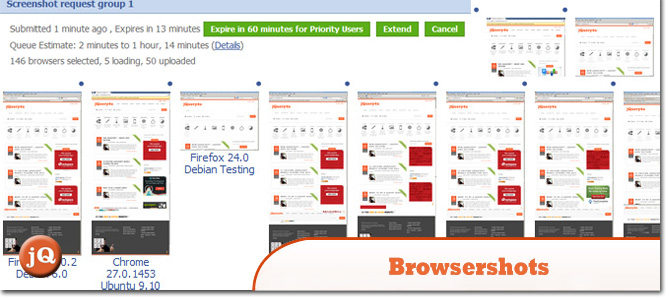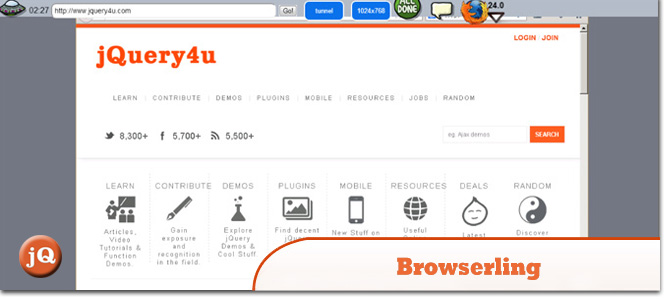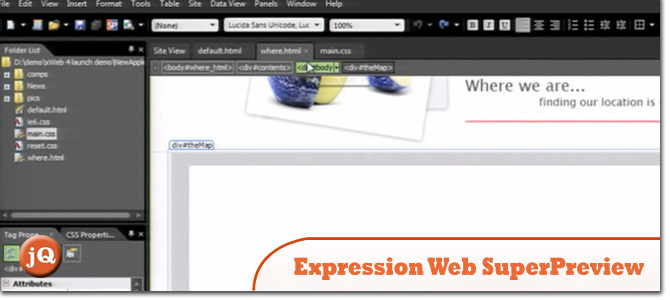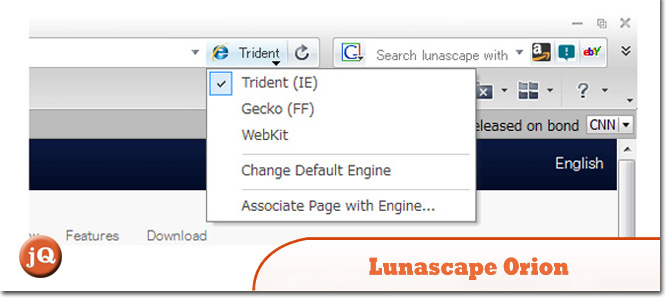Another set of automated browser testing tools but in this post they are free ones – 6 FREE Online Browser Testing Tools. They automate the process of viewing your site across browsers. Enjoy!
Related Posts:
1. Browsershots
It makes screenshots of your web design in different operating systems and browsers.
 Source + Demo
Source + Demo
2. Browserling
An interactive cross-browser testing.
 Source + Demo
Source + Demo
3. IE NetRenderer
Allows you to check how a website is rendered by Internet Explorer 10, 9, 8, 7, 6 or 5.5, as seen from a high speed datacenter located in Germany.
 Source + Demo
Source + Demo
4. Expression Web SuperPreview
A visual debugging tool for cross-browser testing.
 SourceDemo
SourceDemo
5. IETester
It is a free WebBrowser that allows you to have the rendering and javascript engines of IE10, IE9, IE8, IE7 IE 6 and IE5.5 on Windows 8 desktop, Windows 7, Vista and XP, as well as the installed IE in the same process.
 Source + Demo
Source + Demo
6. Lunascape ORION
A simple, easy to use browser for Windows.
 Source + Demo
Source + Demo
Frequently Asked Questions (FAQs) on Online Browser Testing Tools
What are the key features to look for in an online browser testing tool?
When choosing an online browser testing tool, there are several key features to consider. Firstly, the tool should support a wide range of browsers and versions, including both desktop and mobile browsers. This ensures that your website or application can be tested across all possible user scenarios. Secondly, the tool should offer real-time testing capabilities, allowing you to interact with your website or application just as a user would. Thirdly, look for tools that offer automated testing features, which can save you time by running routine tests automatically. Lastly, consider the tool’s reporting capabilities. Detailed reports can help you identify and fix issues more efficiently.
How does an online browser testing tool work?
An online browser testing tool works by simulating the behavior of different browsers. It allows you to test how your website or application performs on different browsers, versions, and operating systems without having to install them on your device. The tool renders your website or application in the selected browser and displays it in a virtual environment, allowing you to interact with it just as a user would.
Can I use online browser testing tools for mobile testing?
Yes, many online browser testing tools support mobile testing. They can simulate the behavior of mobile browsers, allowing you to test how your website or application performs on different mobile devices and operating systems. This is crucial in today’s mobile-first world, where a significant portion of web traffic comes from mobile devices.
Are online browser testing tools accurate?
While online browser testing tools strive to accurately simulate the behavior of different browsers, they may not be 100% accurate. This is because they are essentially emulating the behavior of the browser, which may not perfectly replicate the actual browser environment. However, they are generally accurate enough for most testing purposes and can provide valuable insights into how your website or application performs across different browsers.
What is the difference between a browser emulator and a browser simulator?
A browser emulator is a tool that replicates the exact behavior and rendering of a specific browser version. On the other hand, a browser simulator mimics the behavior of a browser but may not accurately replicate all its functionalities. While emulators provide a more accurate testing environment, simulators are often faster and easier to use.
Can online browser testing tools detect JavaScript errors?
Yes, many online browser testing tools can detect JavaScript errors. They can execute JavaScript code in the simulated browser environment and report any errors or issues that occur. This can be particularly useful for identifying and fixing JavaScript-related issues that may affect the functionality of your website or application.
How can I automate tests with online browser testing tools?
Many online browser testing tools offer automated testing features. This typically involves writing scripts or using a record-and-playback feature to automate user interactions with your website or application. The tool can then run these tests automatically at scheduled intervals, saving you time and ensuring consistent testing coverage.
Can online browser testing tools help with cross-browser compatibility testing?
Yes, online browser testing tools are designed to help with cross-browser compatibility testing. They allow you to test how your website or application performs on different browsers, versions, and operating systems, helping you ensure a consistent user experience across all platforms.
Are online browser testing tools secure?
Security is a crucial consideration when choosing an online browser testing tool. Most reputable tools take measures to ensure the security of your data, such as using secure connections, encrypting data, and complying with data protection regulations. However, it’s always a good idea to review the tool’s security policies and practices before using it.
Do I need technical skills to use online browser testing tools?
While some technical knowledge can be helpful, many online browser testing tools are designed to be user-friendly and do not require extensive technical skills. They often provide intuitive interfaces and easy-to-use features, making them accessible to users of all skill levels. However, more advanced features, such as automated testing, may require some familiarity with scripting or programming.
 Sam Deering
Sam DeeringSam Deering has 15+ years of programming and website development experience. He was a website consultant at Console, ABC News, Flight Centre, Sapient Nitro, and the QLD Government and runs a tech blog with over 1 million views per month. Currently, Sam is the Founder of Crypto News, Australia.

